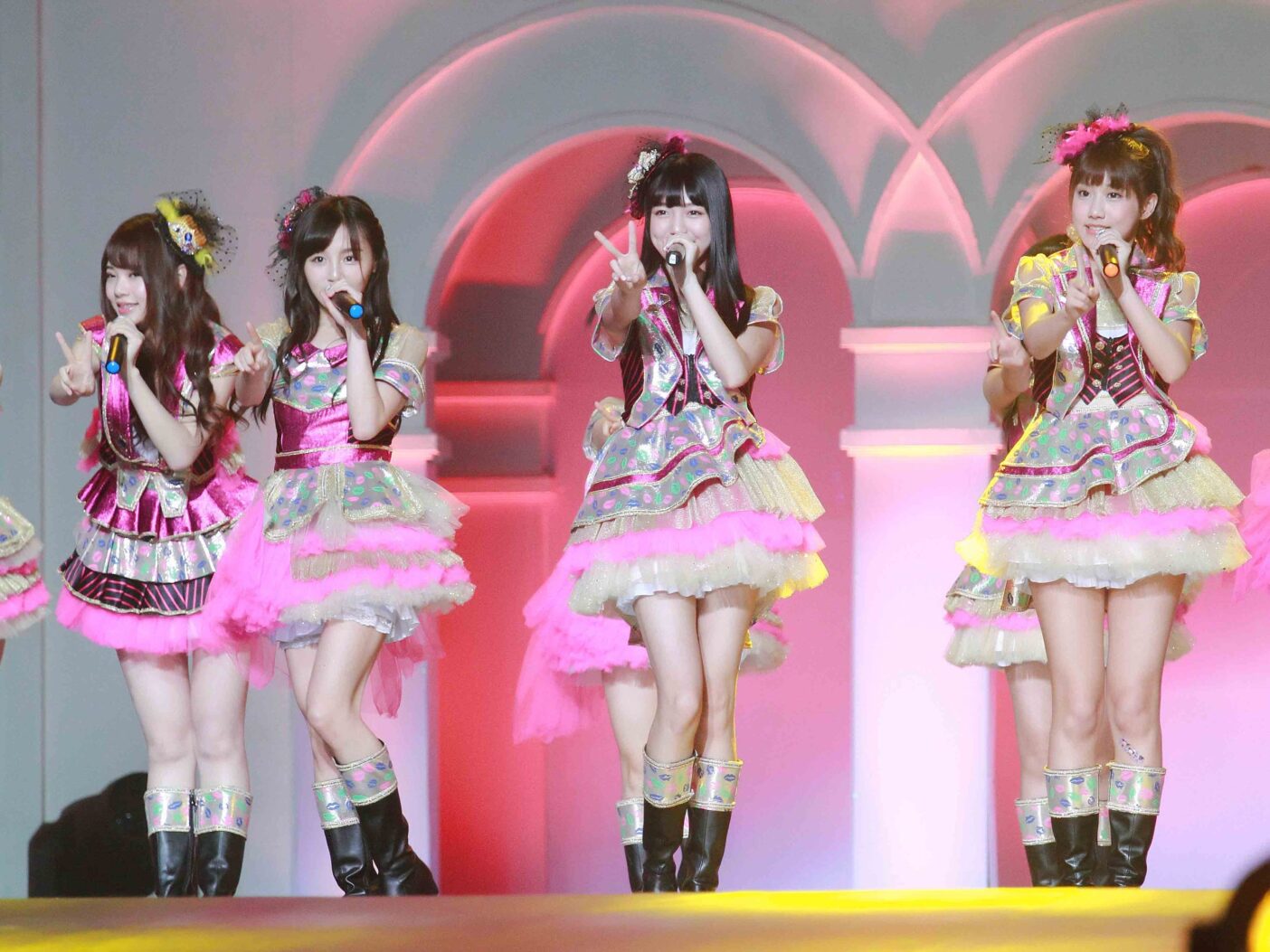Il fenomeno delle idol: le Lolite ipersessualizzate della cultura giapponese
Si chiamano idol, e sono bambine che cantando e danzando vendono la propria immagine per stuzzicare le fantasie dei maschi giapponesi.

Si chiamano idol, e sono bambine che cantando e danzando vendono la propria immagine per stuzzicare le fantasie dei maschi giapponesi.

(English translation below)
La scena è inquietante: centinaia e migliaia di uomini che si agitano goffi davanti ad un palco dove ad esibirsi non è un gruppo rock o un cantante adulto, ma bambine, spesso piccolissime, che danzano e cantano indossando gonnelline di tulle e fiocchetti multicolor tra i capelli.
Vengono chiamate idol: piccole starlette idolatrate in quella che è diventata una vera industria, con la commercializzazione della donna-bambina. Sì, perché è tutto un business. I fan sono esclusivamente uomini, che pagano non solo per assistere ai loro concerti, ma soprattutto per quello che avviene dopo l’esibizione.
E’ proprio il dopo concerto il momento più appetitoso per i giapponesi, spesso agé, che possono incontrare le loro Lolite e scambiare qualche chiacchiera in una finzione consapevole in cui queste bambine interpretano con loro il ruolo di giovani amanti.
Ma attenzione, non si tratta di prostituzione. Non esiste alcun contatto fisico tra il maschio e la bambina, anzi tutto è rigorosamente controllato dagli agenti, che curano e organizzano gli incontri a distanza ravvicinata, perché avvengano nel rispetto delle regole.

Firme di autografi, dono di fotografie in cui le bambine posano in atteggiamenti stuzzicanti e maliziosi, e promesse di rivedersi al prossimo concerto. Ma non finisce qui: le bambine vendono se stesse anche per incontri e passeggiate serali, durante le quali vige il severo divieto di contatti fisici.
E’ l’agente ad organizzare l’incontro, a seguire da vicino la loro passeggiata e a riscuotere l’incasso a fine prestazione. Incontri in cui, per dirla secondo quanto raccontano gli uomini, si ha la sensazione di essere davvero fidanzati con quelle piccole fanciulle idealizzate. Piccole parentesi romantiche, per spezzare la monotonia di vite da single senza emozioni o vite coniugali appiattite dalla routine. Uomini affetti dalla sindrome di Lolita, un’attrazione fortissima che li spinge a incontri ripetuti e continui, e ad un collezionismo fotografico fatto di immagini in cui le fanciulle ammiccano con, apparentemente, incosciente complicità.
L’uomo infatti può chiacchierare con la sua idol e scattarle delle fotografie, che poi potrà consultare nella sua solitudine per stimolare le proprie fantasie. Circa 110 euro per comprare la compagnia di una starlette per la durata di poco meno di un’ora.
Ogni ragazzina può essere dunque noleggiata da vari uomini a sera, per un totale di quattro o cinque incontri.
L’ossessione per la donna-bambina è un fenomeno incredibilmente esteso in tutto il Giappone. Negli ultimi anni si vedono idol dappertutto: non solo nei concerti, ma anche nei locali gastronomici, davanti ai negozi, nei manga. Un fenomeno assolutamente legale in Giappone, un commercio che coinvolge numeri enormi: circa diecimila ragazzine per qualcosa a metà strada tra il culto, l’idolatria e la pedofilia.
Ragazzine che indossano calzettoni colorati sotto gonne a sbalzo e bustini colorati dai quali spuntano veli, fiocchi e merletti, con volti truccati magistralmente proprio per idealizzare la perfezione femminile in quelle labbra a cuore e in quegli occhioni da cucciola indifesa.

Le idol devono essere molto giovani, alcune hanno appena sette anni e sono già in carriera. Bambine che diventano prodotti di consumo per soddisfare i desideri inappagati dei maschi giapponesi. La formula per il successo è molto semplice: abitini svolazzanti, parole romantiche, canzoni d’amore e fascino infantile.
Alcune di queste idol sono delle vere celebrità: ma nascono da progetti di marketing sviluppati a tavolino, come l’Akishibu Project, un gruppo di ragazze idol giapponesi formato da un ex membro del BiS (altro gruppo idol giapponese) che attualmente conta otto ragazze. Il gruppo si esibisce regolarmente al TwinBoxAkihabara, oltre ad esibirsi in concerti dal vivo dentro e fuori il Giappone.

Le più piccole sono introdotte nel settore direttamente dai loro genitori, che le fotografano in pose piccanti per lanciarle sui social e far loro accumulare follower così da destare l’interesse di qualche agente. Una volta in mano all’agente il gioco è fatto: la bambina diventa una starlette e comincia la sua brillante e veloce carriera. Molto breve per la verità, superati i 22 anni si è già considerate vecchie.
Ragazze che non possono avere un fidanzato, perché se colte in una vera relazione sentimentale subiscono la immediata rescissione del contratto di ingaggio e spesso l’umiliazione pubblica.
Una infanzia e un’adolescenza pervase da un unico sogno, quello di diventare famose, di esibirsi su un palco e di apparire su copertine e manifesti, un sogno che poi si infrange nella morbosità di uomini che così come pagano per la loro immagine di bimbe pure altrettanto velocemente sono disposti a dimenticarle quando sono ormai cresciute.
Un fenomeno che per la nostra cultura occidentale risulta abberrante e che strizza l’occhio alla pedofilia, ed è straordinariamente ben raccontato dal reporter Constantin Simon in un reportage in lingua francese prodotto da Zébra Prod e diffuso un paio di giorni fa da Franceinfo.
Una realtà contemporanea che esige una riflessione profonda sul rapporto dell’infanzia o adolescenza con la sfera adulta. Nel reportage sembra che le bambine siano perfettamente consapevoli di cosa fanno, determinate nel perseguimento dei loro obiettivi: sanno di dover fingere flirtando con gli uomini, per sedurli e conquistarne la fedeltà assoluta, in un gioco che li porterà a spendere una gran parte del loro stipendio in concerti, incontri a pagamento e regali.

Si può davvero parlare di consapevolezza? Le bambine, le idol, nel reportage appaiono convinte di ciò che fanno, ma quanto influisce sulla loro psiche la disparità di potere con l’adulto, e quanto sono soggette alla manipolazione degli agenti, del mercato e degli stessi genitori? E se fossero invece gli uomini le vere vittime? Succubi di un desiderio che non si spegne mai perché impossibilitati dal consumare la loro insana passione?
La questione richiama alla mente il romanzo Lolita di Vladimir Vladimirovič Nabokov che racconta la morbosa passione di un uomo maturo per una ragazza pre-adolescente (da cui fu tratto il celebre film di Stanley Kubrick con una sceneggiatura scritta dallo stesso Nabokov).
Ma anche il più recente libro Mia inquieta Vanessa, di Kate Elizabeth Russel, in cui la storia è narrata in prima persona da Vanessa, una giovane studentessa che allaccia una relazione con il suo professore quarantenne. Qui il lettore rimane spiazzato dal punto di vista di Vanessa, che appare incerto e fragile, consentendo di esplorare tutte le ambiguità di questo tipo di relazioni squilibrate dalle differenti età anagrafiche delle persone coinvolte.
Infine non possiamo non mettere a confronto questa sottocultura pop giapponese che idolatra la donna-bambina con il movimento metoo che invece combatte l’oggettivazione della donna e la sua condizione di vittima dei desideri sessuali del maschio socialmente dominante.
Due realtà diametralmente opposte, ma entrambe frutto di questi tempi, che evidenziano la poliedrica sfaccettatura di una società sempre più difficile da analizzare nella sua proteiforme contemporaneità.
ENGLISH VERSION
They are called idols, and they are little girls who sell their image by singing and dancing to tease the fantasies of Japanese males.
The scene is disquieting: hundreds and thousands of men fidgeting awkwardly in front of a stage where the performer is not a rock group or an adult singer, but little girls, often very small, who dance and sing wearing tulle skirts and multicolored bows among hair.
They are called idols: little starlets idolized in what has become a real industry, with the commercialization of the woman-child. Yes, because it’s all a business. The fans are exclusively men, who pay not only to attend their concerts but above all for what happens after the performance.
It is precisely after the concert the most appetizing moment for the Japanese, often agé, who can meet their Lolitas and exchange a few chats in a conscious fiction in which these little girls play the role of young lovers with them.
But be careful, this is not about prostitution. There is no physical contact between the man and the girl, on the contrary, everything is strictly controlled by the agents, who take care of and organize the close-range encounters, so that they take place in compliance with the rules.
Autograph signatures, the gift of photographs in which the girls pose in teasing and mischievous attitudes, and promises to meet again at the next concert. But that’s not all: the girls also sell themselves for meetings and evening walks, during which there is a strict ban on physical contact.
It is the agent who organizes the meeting, closely follows their walk, and collects the proceeds at the end of the service. Encounters in which, to put it according to what men say, one has the feeling of being truly engaged with those idealized little girls. Small romantic parentheses, to break the monotony of single lives without emotions or married lives flattened by routine. Men suffering from the Lolita syndrome, a very strong attraction that drives them to repeated and continuous encounters, and to a photographic collection made up of images in which the girls wink with, apparently, unconscious complicity.
In fact, the man can chat with her idol and take photographs of her, which he can then consult in his solitude to stimulate his own fantasies. Around 110 euros to buy the company of a starlet for just under an hour.
Each girl can therefore be hired by various men in the evening, for a total of four or five meetings.
The obsession with the woman-child is an incredibly widespread phenomenon throughout Japan. In recent years, idols have been seen everywhere: not only in concerts but also in restaurants, in front of shops, and in the manga. An absolutely legal phenomenon in Japan, a trade involving enormous numbers: about ten thousand girls for something halfway between worship, idolatry, and pedophilia.
Little girls wearing colorful socks under embossed skirts and colored bodices from which veils, bows, and laces peek out, with masterfully made-up faces to idealize feminine perfection in those heart-shaped lips and those defenseless puppy eyes.
The idols must be very young, some are just seven years old and already in their careers. Little girls become consumer products to satisfy the unsatisfied desires of Japanese males. The formula for success is very simple: fluttering dresses, romantic words, love songs, and childish charm.
Some of these idols are real celebrities: but they are born from marketing projects developed at the table, such as the Akishibu Project, a group of Japanese idol girls formed by a former member of BiS (another Japanese idol group) which currently has eight girls. The group performs regularly at TwinBox Akihabara, as well as performing live concerts in and outside Japan.
The little ones are introduced into the sector directly by their parents, who photograph them in stimulating poses to launch them on social networks and make them accumulate followers so as to arouse the interest of some agents. Once in the hands of the agent, the game is done: the little girl becomes a starlet and her brilliant and fast career begins. Very short actually, after 22 they are already considered old.
Girls cannot have a boyfriend, because if caught in a real sentimental relationship they suffer the immediate termination of the employment contract and often public humiliation.
A childhood and adolescence pervaded by a single dream, that of becoming famous, of performing on stage and appearing on covers and posters, a dream that then shatters in the morbidity of men who are very quick to fall in love with their image of pure girls and just as quickly are willing to forget them when they are grown up.
A phenomenon that for our Western culture is abhorrent and that winks at pedophilia, and is extraordinarily well told by reporter Constantin Simon in a French-language report produced by Zébra Prod and released a couple of days ago by Franceinfo.
A contemporary reality that requires a profound reflection on the relationship between childhood or adolescence with the adult sphere. In the report it seems that the girls are perfectly aware of what they are doing, determined in the pursuit of their goals: they know they have to pretend by flirting with men, to seduce them and win their absolute loyalty, in a game that will lead them to spend a large part of their salary in concerts, paid meetings and gifts.
Can we really talk about awareness? The little girls, the idols, in the report appear convinced of what they do, but how much does the disparity of power with the adult affect their psyche, and how much are they subject to the manipulation of agents, the market, and their parents themselves? What if men were the real victims instead? Succubus of a desire that never goes out because they are unable to consume their insane passion?
The question brings to mind the novel Lolita by Vladimir Vladimirovich Nabokov which tells of the morbid passion of a mature man for a pre-adolescent girl (on which the famous film by Stanley Kubrick was based with a screenplay written by Nabokov himself).
But also the more recent book Mia inquieta Vanessa, by Kate Elizabeth Russel, in which the story is narrated in the first person by Vanessa, a young student who establishes a relationship with her forty-year-old professor. Here the reader is displaced by Vanessa’s point of view, which appears uncertain and fragile, allowing us to explore all the ambiguities of this type of relationship unbalanced by the different personal ages of the people involved.
Finally, we cannot fail to compare this Japanese pop subculture which idolizes the woman-child with the metoo movement which instead fights the objectification of women and their condition as victims of the sexual desires of the socially dominant male.
Two diametrically opposed realities, but both are the result of these times, which highlight the polyhedric facet of a society that is increasingly difficult to analyze in its protean contemporaneity.
